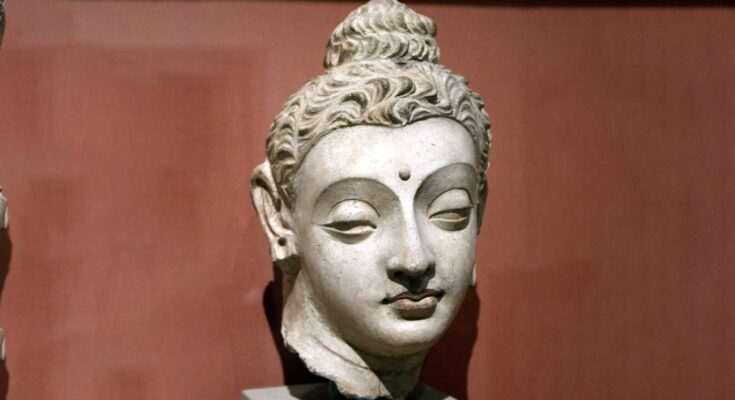Both Buddhism and Stoicism emphasize self-control, ethical living, and the attainment of a passionless state. However, the Indian philosophy predated Stoicism by about 500 years. Did Buddhism influence Greek Stoicism and thought, and, if so, how did it do so a continent away?
Practitioners of Stoicism and Buddhism deeply understand life’s impermanence and the need to overcome desires. The philosophies teach mental discipline and detachment from external circumstances as paths to inner peace. In Stoicism, “apatheia” means freedom from emotional disturbance, closely mirroring Buddhism’s “nirvana,” the liberation from suffering.
Both suggest that true tranquility comes from mastering one’s mind and emotions rather than external conditions. They also emphasize ethical living as a cornerstone of their teachings. Stoics strive to live according to nature and reason, while Buddhists follow the Dharma. Wisdom and self-mastery are central to both philosophies, leading to a life in harmony with the natural order and freedom from unnecessary suffering.
These similarities suggest that, despite cultural differences, both philosophies developed a shared approach to the attainment of inner peace and wisdom. Could Buddhism have influenced Stoicism?
Alexander the Great’s encounters with Buddhism
Alexander the Great’s campaigns (334-323 BC) spread Greek influence into Central Asia, where Buddhism was already present. During this time, the Macedonian established Greek-style cities throughout his empires to blend Greek and Eastern culture. Part of his method included bringing Greek philosophers with him to interact with foreign ways of thinking. One such philosopher, Pyrrho of Elis, traveled with Alexander the Great to the East.
Beckwith’s 2015 Greek Buddha argues that Pyrrho’s encounters with Indian philosophers profoundly shaped his philosophical outlook. Pyrrho’s later establishment of the philosophical school of Skepticism, which emphasized doubt and the suspension of judgment, bears striking resemblances to Buddhist teachings on the unreliability of sensory perceptions and impermanence of the material world.
The Influence of Pyrrho’s Skepticism on Stoicism
The influence of Pyrrho’s Skepticism on Stoicism is supported by such developments as the Stoic adoption of the concept of “apatheia” or emotional detachment. According to Beckwith, this concept, first espoused by Pyrrho, becomes a central tenet of Stoicism, which in turn, learned such ideas from Indian philosophers.
Beckwith’s analysis suggests that Pyrrho’s engagement with proto-Buddhist ideas could have been a conduit through which these Eastern philosophies entered and influenced Stoic thought. The emphasis on inner tranquility and the rejection of external disturbances in Stoicism mirrors the Buddhist approach to achieving enlightenment through mental discipline and detachment from worldly concerns.
Ashoka the Great and the spread of Buddhism to the Greek world
Not long after Alexander’s death, Ashoka the Great (268-232 BC), himself likely part Greek, inherited cities populated by large swathes of Greeks, previously held by Alexander’s generals.
After converting to Buddhism, Ashoka promoted the Dharma (Buddha’s teachings) far beyond his empire, even reaching the Hellenistic world. According to his edicts that were written on polished rock, his efforts to spread Buddhism included sending emissaries to Greek-speaking regions. However, his emissaries have not been documented in Greco-Roman sources.
Despite the lack of Greco-Roman corroboration of Ashoka’s missionaries to the Mediterranean, Indian sources purport the existence of Greek Buddhists in Asia.
Greek Buddhists and the Mauryan Kingdom
Among the evidence of Greek Buddhists in Asia is Ashoka’s Edicts written in proficient Greek. This suggests that there were Greek Buddhists in his empire at the time the edicts were written.
Historian Seldeslachts argues in The Final Frontier that significant numbers of Greeks converted to Buddhism during Ashoka’s reign. Buddhist literature records Yonaka (Greek) monks such as Dhammarakkhita who were responsible for spreading the message to their countrymen.
After the decline of Ashoka’s Mauryan Empire, Seldeslachts argues that the Greek monk, Dhammarakkhita, likely joined the Greco-Bactrian and Indo-Greek kingdoms, where Greek culture flourished in the heart of Asia.
Ai Khanoum: A Greek city transmitting Buddhism to Greece?
Dhammarakkhita would have found a quintessentially Greek city and a Greek-speaking population. Findings from Ai-Khanoum, including Delphic inscriptions on a tomb, show a strong connection to the Mediterranean well after the decline of Alexander’s empire.
According to the inscription, the person who wrote the inscriptions was Clearchus, likely the Greek philosopher who, according to historians, traveled to the lofty valleys of Northwest India towards the start of the 3rd Century BC.
If it was Clearchus who wrote the inscription, it is likely he would have exchanged ideas with locals, including Greco-Buddhists who were likely converted by Dhammarakkhita. This may be further evidence of Buddhism’s influence on Greek philosophers, but it remains speculative.
At the very least, Clearchus’ inscription suggests that Ai-Khanoum was not isolated from the Mediterranean. Ai-Khanoum’s Greco-Buddhists may then have had some contact and even influence over philosophical thought in Greece.
Did Buddhism influence Greek Stoicism?
The evidence supporting Buddhism’s influence on ancient Greeks is compelling, especially considering historical interactions between Greek and Indian philosophers during and after Alexander the Great’s campaigns.
The similarities between Stoic and Buddhist teachings, the documented conversion of Greeks in Asia and their connection to the Mediterranean, and the influence of Pyrrho’s Indian-inspired thought on Stoicism suggest that these two great philosophical cultures were not isolated. Scholars such as Beckwith are convinced that Indian thought influenced Stoicism. However, he isn’t without his detractors.
Despite this ambiguity, exploring these connections gives us a deeper understanding of how ideas traveled across continents and how connected the ancient world actually was.



